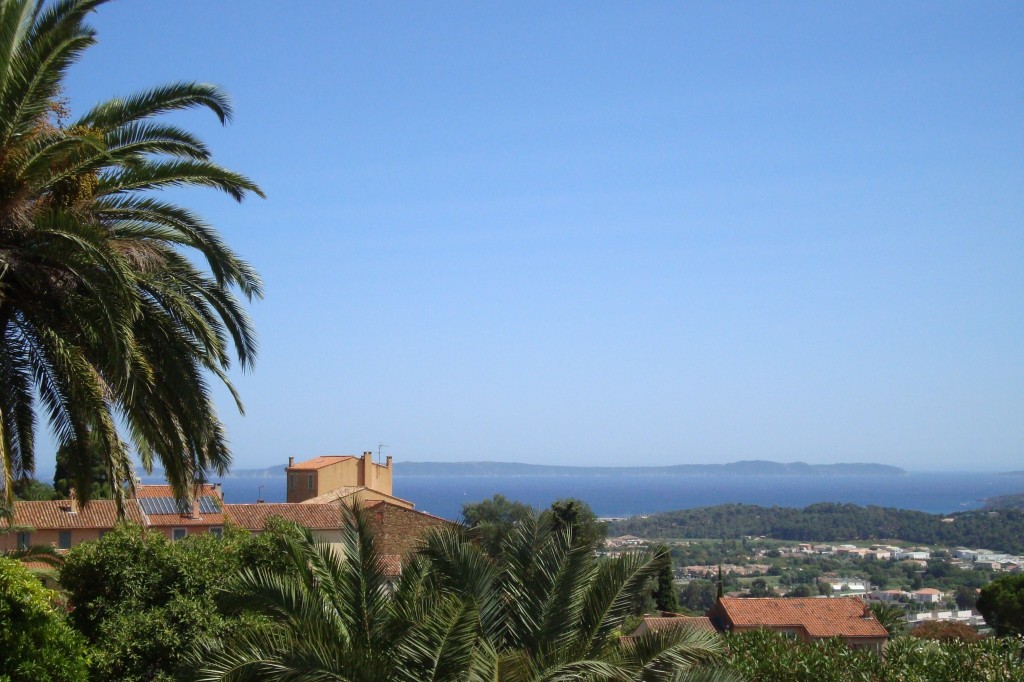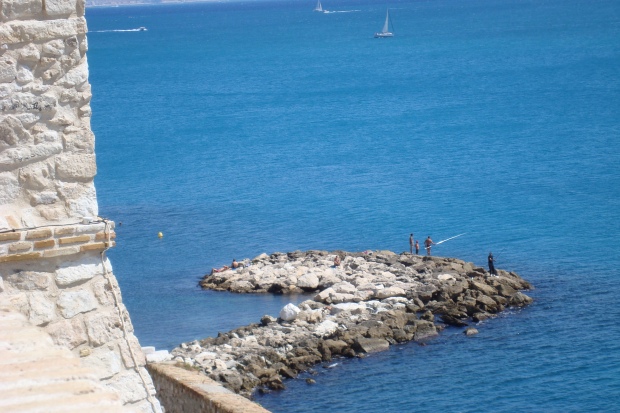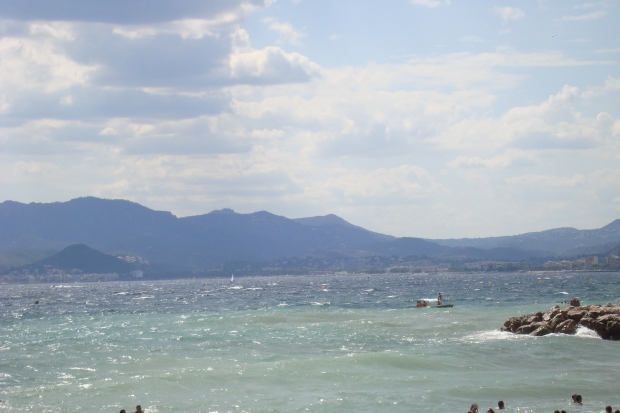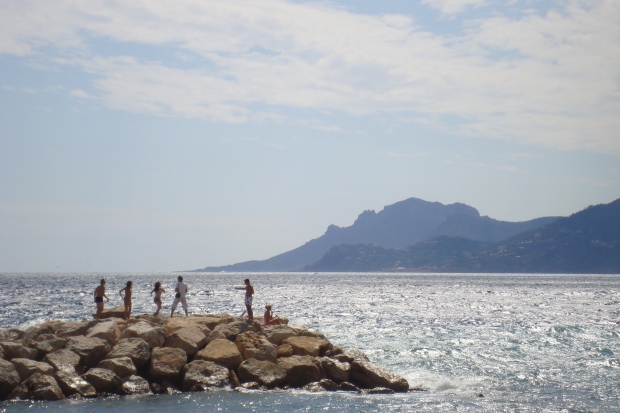Half an hour’s drive from our house is a place I call “Scott Fitzgerald’s Beach.” No doubt it has a more formal appellation. I call it that to distinguish it from “our beach,” which lies on an easily overlooked curve a further ten minutes down the Cap d’Antibes. Narrow, pebbly, ending abruptly in a decaying concrete jetty, our beach can claim only dubious charms, and this lack of tourist appeal happily guarantees that for most of the year it is sparsely populated. Rather than layers of oiled sunseekers, packed together like so many sardines on the grill, at our beach one finds the normality of local families, joined by an occasional spear fisher or stand-up paddle surfer making their way backwards out into the water. And always there is a representative of my favourite tribe, la maman seule. Topless, stretch marks unashamedly on display, she picks the sand out of her goûter while keeping a close eye on her small son who, clad in a full Batman outfit accessorised by waterwings, is tippy-toeing it towards the waves.
But in high season even our beach can be overrun. When that happens, we retreat back up the Boulevard John F. Kennedy, and turn into the warren of little streets to the south. The names here are by turns evocative (Chemin de l’Olivette, Chemin des Chênes Verts: Road of the Little Olives, Way of the Green Oaks) or, to a writer’s eye, happily eccentric (Chemin des Nielles, la Rampe de Graillon: Blight Road, the Greasy Ramp). On this particular day, we find ourselves on the Avenue Mrs. Beaumont, named after the American woman who gave her nearby villa Eilenroc to the city of Antibes as a cultural centre. Parking illegally, along with everyone else, we make our way on foot down towards the sea. Any houses which can be seen over the high walls girding these streets are immaculately cared for. No growing thing is parched, no car covered in dust; no summer detritus of wet towels or swimsuits decorate these balconies. The season is acknowledged, but held to its best behaviour. The scent of hibiscus and bougainvillea, from fist-sized blossoms spilling in unruly waves over stone walls, is heady, narcotic. Everything shimmers in the heat. The only sounds here are the slap of sandals on pavement, the puff of laboured breath on the still humid air.
A sharp turn, and there’s the sea glimmering at the end of the allée, reached not directly from the path, but through a door in a crumbling wall. I follow Mick along a track tangled with pine scrub, the needles sticky and resinous against my arms, the air around me alive with cicadas. The soft scramble of the tropical gardens behind us melts like a fever dream. Beyond a stand of cypress trees lies the cleansing shock of white rock against pale blue sky, the darker blue of the sea. Looking out towards the horizon, for once free of jet skis and house-sized yachts, I think, Scott Fitzgerald swam here. Zelda waved at him from her perch on the rocks, and poured something sweet from a silver shaker into her improbable cocktail glass. My inner pedant remarks that these speculations are literary fantasy. The Hôtel du Cap and its “short dazzling beach” are fifteen minutes walk down the coast, behind an intricate fence that rears up from the path to ensure that no common folk will pass. But the initial thought returns, refines itself: this is the view that he saw. For a moment, I feel that rare connection between this place and the one I come from; I sense the presence of others who came here in search of reinvention.
I am not at ease in the ocean. Years of childhood lessons at the local pool with a succession of bored, underpaid teenagers produced a competent swimmer, but not a comfortable one. The moment I enter any significant body of water, I am eight years old again, blind, pale and shivering, wearing a hand-me-down swimsuit two sizes too large, the straps held together in back with a shoelace, waiting for the inevitable moment when I will jump clumsily into the water and the straps will fall down, to the raucous amusement of the sidelines. Being an American child, I was made to suffer through various forms of amateur aversion therapy: forced by an impatient lifeguard to jump off the high dive after losing my nerve; someone tossing me into an oncoming wave at the Jersey Shore with shouted instructions to “just get over it.” None of it had any effect. I do not care that we all come from the water, or that the sea, as Jimmy Joyce would have it, is our great sweet mother. My ocean is a jungle cat in the long grass, beautiful but unpredictable in her whims, waiting for a suitable candidate to pluck from the herd. I prefer to watch her from a distance: cultivating what I claim is a healthy respect, but what I privately acknowledge is fear.
My husband is happier in the water than out of it. A strong, confident swimmer, some of his most cherished memories are of his father teaching him to swim as a toddler in Dublin: first at the pool in Baldoyle, and then in the bay at the Clontarf Baths. “I remember waterwings, at first,” he says, “and then just leppin’ right in.” By the age of five, he was cycling on his own to the Baths almost every day, and so to him, the ocean means freedom.
Watching Mick swim is one of the quiet joys of my life. Liberated in a visibly joyous way from whatever cares remain behind on shore, it seems the height of foolishness not to join him. So we have an agreement, which I try to honour as often as I can. After fussing rather longer than necessary with the pre-swim routine of towels, sunscreen, lip salve, I force myself to take off my glasses, tucking them safely into the depths of the beach bag. Then, clinging to Mick’s hand like a small child entering a stranger’s house, I allow him to lead me to the water’s edge.
The shoreline is treacherous at Scott Fitzgerald’s beach. There is no smooth transition from sand to wave. Instead Mick guides me through a series of jagged defiles, passages slippery with algae and seaweed. Along the bottom of one fissure is a several-days dead eel, oddly stretched at full length. Stranded by the tide, perhaps. But its careful placement suggests a sign or portent, an arcane warning left by a retreating genius loci. The rivulets around our feet grow more insistent, develop patterns, frequency. As the water deepens, so do the colours of the wrack beneath the surface. Their workaday shades, rusty and faded further up on beach, intensify to vibrant jewel tones: peridot, onyx, smoky topaz. Streaming languidly in the current, they cry out to be touched.
That is a dangerous proposition, as one is more likely to come up with a handful of irritated sea urchin rather than the treasures of the Orient. But I’m feeling brave today. Once my feet can no longer touch bottom, I slip from Mick’s grasp and swim over to a massive boulder. I climb up onto the rock and boldly take a seat, steadying myself with my feet, safe in their funny little rubber shoes. The sun, striking through the surface of the water, reveals tiny silver fish nibbling at my ankles. There is a girl crouching on a rock by the shoreline. Her dark hair lifts on the same breeze stirring the branches in the cypress grove nearby. Brown-skinned, long-limbed, she is poised effortlessly on that rock as if sprung from it, a young goddess gazing out over her domain. Further out, at the limit of my vision, Mick has cleared the last enfilade of rocks. Diving beneath the surface, he is transformed into some great seabird, one who is strangely at home in both his native elements. Slowly, with rhythmic precision, his broad shoulders and long arms slice and pull, striking out for deeper waters.
Even by the impossible standards of this place, it is an exceptionally beautiful day.
amrh, who has been working on this piece for three months and needs to be done with it
Antibes and Mougins, Summer 2012





Beautifully written, Ri! It absolutely evoked the spirit of the place and took me there with you.
–Beth
Thank you sweetheart. PS You come here, I show you it! 🙂